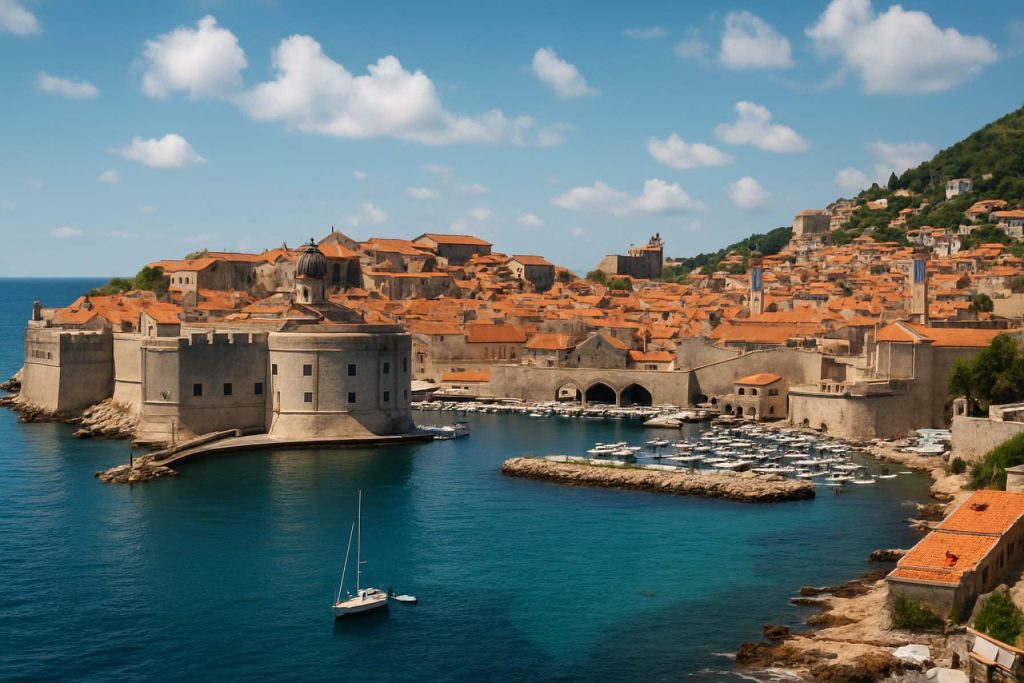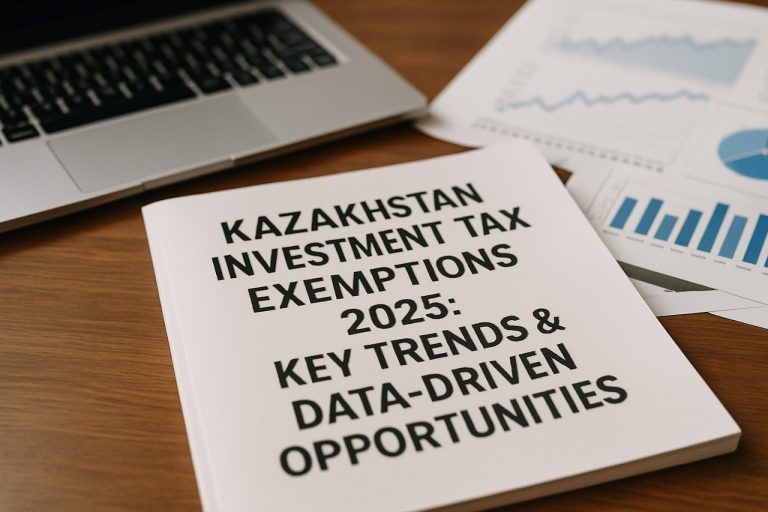
Table of Contents
- 1. Executive Overview: Why Croatia Is on Investors’ Radars in 2025
- 2. Macroeconomic Snapshot: Key Statistics and Growth Drivers
- 3. Regulatory Environment: Laws, Taxation, and Compliance Essentials
- 4. Foreign Investment Policies: What International Investors Need to Know
- 5. Sector Spotlight: Real Estate, Tourism, Technology, and Renewable Energy
- 6. Navigating Croatian Bureaucracy: Licensing, Permits, and Business Formation
- 7. Financial Incentives and Government Support Programs
- 8. Risk Factors: Political, Economic, and Legal Challenges
- 9. Case Studies: Recent Success Stories and Lessons Learned
- 10. Outlook 2025–2030: Emerging Trends and Strategic Recommendations
- Sources & References
1. Executive Overview: Why Croatia Is on Investors’ Radars in 2025
Croatia’s investment landscape is undergoing significant transformation as the country enters 2025, driven by its continued integration into European economic frameworks, strategic geographic position, and business-friendly reforms. Having joined the eurozone and Schengen Area in 2023, Croatia now offers investors the stability of the euro currency and seamless market access across much of Europe, reducing currency risk and streamlining cross-border operations (Government of the Republic of Croatia).
Legal and regulatory reforms have been high on the government’s agenda, particularly aimed at simplifying business start-up procedures, digitizing administrative processes, and enhancing transparency. The “Croatia 2030” development strategy, adopted in 2021, continues to shape regulatory updates as the country moves towards a knowledge-based, green economy (Government of the Republic of Croatia). The Foreigners Act and Company Law have both been amended in recent years to streamline residence permits for investors and facilitate the establishment of new companies (Narodne novine).
Key investment sectors in 2025 include renewable energy, tourism infrastructure, IT and digital services, and advanced manufacturing. Croatia’s push for sustainability and digitalization is supported by substantial EU funding, with over €9 billion allocated from the Recovery and Resilience Facility and Cohesion Funds for 2021–2027 (European Commission). FDI inflows have rebounded post-pandemic, surpassing €3.5 billion in 2023 and showing an upward trend into 2024 and early 2025 (Croatian National Bank).
- Corporate income tax rates remain competitive at 10% for businesses with turnover under €1 million and 18% for others (Tax Administration of the Republic of Croatia).
- Labor market reforms and digital nomad visa programs are attracting both skilled workers and entrepreneurs.
- Compliance with EU directives on anti-money laundering (AML) and data protection (GDPR) is strictly enforced, with regular updates to national law (Republic of Croatia – National Legislation).
Looking forward, Croatia’s outlook remains robust, with GDP growth projected around 3% annually through 2026 and ongoing public investment in infrastructure, digital transformation, and green transition. The combination of EU membership, euro adoption, and pro-investment reforms position Croatia as an increasingly attractive destination for international investors in the coming years.
2. Macroeconomic Snapshot: Key Statistics and Growth Drivers
Croatia’s macroeconomic landscape in 2025 is marked by resilient growth, ongoing European integration, and a stable regulatory environment, all of which are key drivers for investors. The country’s admission to the eurozone in January 2023 and participation in the Schengen Area have further solidified its economic ties with the European Union, streamlining cross-border investment and reducing transaction costs. According to the Croatian National Bank, foreign direct investment (FDI) inflows in 2023 reached €3.1 billion, demonstrating investor confidence and a positive trend expected to continue in 2025.
Official government forecasts project real GDP growth at around 2.5% for 2025, following robust post-pandemic recovery rates in recent years. Key sectors underpinning this growth include tourism, real estate, information technology, renewable energy, and advanced manufacturing. Tourism, in particular, remains a cornerstone of the Croatian economy, contributing over 20% to GDP and attracting significant capital, with a record 20.6 million tourist arrivals registered in 2023 according to the Ministry of Tourism and Sports of the Republic of Croatia.
Croatia’s accession to the euro has reduced foreign exchange risk for investors and facilitated easier access to EU funding instruments, supporting infrastructure development and innovation. The government continues to implement reforms to enhance the business environment, streamline administrative procedures, and promote digitalization. The Croatian Chamber of Economy reports ongoing improvements in ease of doing business, with simplified company registration processes and digitalized government services seen as especially attractive for foreign investors.
Compliance and regulatory frameworks are harmonized with EU standards, ensuring investor protection and transparent dispute resolution. Croatia offers various investment incentives, including tax breaks for strategic projects and subsidies for research and development. The Agency for Investments and Competitiveness provides detailed guidance and support for both domestic and international investors, highlighting opportunities in green energy, logistics, and technology.
Looking ahead, Croatia is expected to benefit from continued EU funding, ongoing infrastructure upgrades, and increased integration into European supply chains. The government’s National Recovery and Resilience Plan, financed through the EU Recovery and Resilience Facility, allocates substantial resources for digital transformation and green transition, further underpinning the country’s attractiveness as an investment destination through 2025 and beyond.
3. Regulatory Environment: Laws, Taxation, and Compliance Essentials
Croatia’s regulatory environment for investors is shaped by its membership in the European Union and adherence to international standards on transparency and financial compliance. As of 2025, investment activities are governed by a combination of domestic legislation and European directives, ensuring a stable and predictable framework for foreign and domestic investors.
The principal law governing foreign investment is the Investment Promotion Act, which ensures equal treatment of domestic and foreign investors and provides incentives for investments in strategic sectors such as technology, tourism, and renewable energy. In 2024, amendments introduced additional tax benefits for projects exceeding €3 million and streamlined permitting for greenfield investments (Narodne novine).
Croatia’s corporate tax rate remains competitive at 18% for businesses with annual revenues above €1 million, while a reduced rate of 10% applies to smaller enterprises. The standard value-added tax (VAT) is 25%, with reduced rates for certain goods and services. Investors benefit from tax reliefs, especially in designated assisted areas and free trade zones, as defined by the Ministry of Finance – Tax Administration.
- Company Formation: Foreign investors can establish limited liability companies (d.o.o.) with minimal capital requirements. In 2023, digitalization of company registration was further enhanced via the Court Register, allowing faster incorporation and compliance.
- Land Ownership: EU citizens and companies can freely acquire real estate, while non-EU investors face certain restrictions unless reciprocity agreements exist (Ministry of Physical Planning, Construction and State Assets).
- Labor Regulations: Croatia’s labor law framework aligns with EU standards, and investors must comply with rules on employment contracts, minimum wage (set at €840 gross in 2025), and social security obligations (Ministry of Labour, Pension System, Family and Social Policy).
Croatia is a signatory to major international investment treaties and adheres to anti-money laundering (AML) and know-your-customer (KYC) regulations, enforced by the Croatian Financial Services Supervisory Agency (HANFA). Ongoing reforms focus on reducing administrative barriers and strengthening digital compliance tools.
With steady GDP growth forecast at 2.5% for 2025 and increasing FDI inflows, Croatia’s regulatory outlook is positive. Continued alignment with EU policy, tax incentives, and digital government initiatives are expected to further enhance the investment climate over the next several years (Government of the Republic of Croatia).
4. Foreign Investment Policies: What International Investors Need to Know
Croatia continues to position itself as an attractive destination for foreign direct investment (FDI) in 2025, leveraging its European Union (EU) membership, strategic Adriatic location, and ongoing economic reforms. The country’s regulatory environment for foreign investors is broadly aligned with EU standards, offering national treatment and legal protections to international investors.
Foreign investors are subject to the Investment Promotion Act and related laws, which provide equal rights to domestic and international entities, including the right to acquire real estate, establish companies, and repatriate profits. Certain sectors, such as defense and agriculture, may require additional approvals or have ownership restrictions, but most industries are open to full foreign ownership. The government continues to reduce administrative barriers and streamline procedures, with a digital one-stop shop for company registration and investment incentives.
Compliance with anti-money laundering (AML) and anti-corruption regulations is a key requirement. Croatia adheres to the EU’s AML directives and maintains a central beneficial ownership register. Investors must also comply with tax obligations governed by the Tax Administration, including corporate income tax (18% standard rate), VAT (25%), and social contributions. Croatia is a signatory to international treaties ensuring investor protection and double taxation avoidance.
In 2023, FDI inflows reached €2.3 billion, with significant contributions from tourism, real estate, manufacturing, and information technology sectors (Croatian National Bank). The government’s National Recovery and Resilience Plan, backed by EU funds, will continue to support infrastructure, digitalization, and renewable energy projects through 2026.
- Foreign investment screening: As of mid-2024, Croatia has implemented the EU’s screening regulation for certain critical sectors (e.g., energy, defense, data infrastructure), requiring prior notification and review.
- Real estate: Non-EU investors may face additional requirements when purchasing agricultural land or property in protected areas (Ministry of Physical Planning, Construction and State Assets).
- Residency: Investors may apply for temporary or permanent residence based on business activities, subject to Ministry of the Interior rules.
Looking ahead, Croatia’s stable EU framework, recent euro adoption, and Schengen entry are expected to enhance investor confidence and further integrate the country into European and global markets. The government’s focus on digital transformation, sustainable tourism, and green energy is likely to provide new opportunities for international investors through 2025 and beyond.
5. Sector Spotlight: Real Estate, Tourism, Technology, and Renewable Energy
Croatia’s investment landscape in 2025 highlights four priority sectors: real estate, tourism, technology, and renewable energy. Each sector is shaped by recent legislative changes, government incentives, and robust demand, underscoring Croatia’s ambitions as a dynamic EU investment destination.
- Real Estate: Croatian real estate continues to attract foreign investors, particularly in coastal and urban areas. The Land Registry reforms and digitalization, spearheaded by the Ministry of Justice and Public Administration, have streamlined property transactions, enhancing legal certainty and transparency. The Croatian Chamber of Economy reports sustained growth in residential and commercial property demand, with foreign buyers representing a significant market share. However, zoning laws and restrictions in protected regions, as administered by the Ministry of Spatial Planning, Construction and State Assets, require careful compliance reviews.
- Tourism: As a cornerstone of the Croatian economy, tourism rebounded strongly post-pandemic, surpassing pre-2020 figures in both arrivals and overnight stays, according to data from the Croatian National Tourist Board. The government has introduced targeted incentives for sustainable tourism infrastructure and digitalization under the National Recovery and Resilience Plan, with significant EU funding channeled into eco-friendly projects. Investors must comply with environmental regulations and obtain permits from the Ministry of Economy and Sustainable Development for tourism-related developments in protected coastal and island areas.
- Technology: Croatia’s tech sector has seen rapid expansion, buoyed by government support through the National Recovery and Resilience Plan and tax incentives for R&D-intensive businesses. The Agency for Investments and Competitiveness reports a surge in IT startups and foreign direct investment, especially in Zagreb and Split. In 2024, amendments to the Companies Act simplified company registration and digital onboarding for investors, further boosting Croatia’s appeal as a regional tech hub.
- Renewable Energy: Croatia is committed to increasing its renewable energy share to 36.6% by 2030, as per targets set by the Ministry of Economy and Sustainable Development. In 2023 and 2024, new legislation and auctions for solar and wind projects have opened up opportunities for private investment. Investors must follow permitting procedures, environmental impact assessments, and grid connection rules overseen by the Croatian Energy Regulatory Agency.
Looking ahead, Croatia’s EU membership, euro adoption, and robust legal framework provide a stable environment for sectoral investment. Ongoing reforms and incentives are likely to further attract domestic and international investors across these strategic sectors through 2025 and beyond.
6. Navigating Croatian Bureaucracy: Licensing, Permits, and Business Formation
Investing in Croatia requires a thorough understanding of the country’s bureaucratic landscape, especially regarding licensing, permits, and business formation. The Croatian government has made significant strides in recent years to streamline administrative procedures for both domestic and foreign investors, aligning its regulatory framework with European Union standards. Nevertheless, navigating the system demands careful attention to legal requirements and compliance obligations.
Company formation in Croatia is regulated primarily by the Companies Act (Zakon o trgovačkim društvima). The most common legal forms for foreign investors include the limited liability company (d.o.o.), joint-stock company (d.d.), and branch office. As of 2025, the digitalization of the company registration process has reduced the average incorporation period to around one week. Registration is conducted through the Court Register managed by the Ministry of Justice and Public Administration, with notarial certification and submission of founding documents required.
Licensing and permits are sector-specific and may involve multiple authorities. For example, construction projects require location and building permits, which are processed by local administrative offices in accordance with the Building Act. Environmental impact assessments, coordinated by the Ministry of Economy and Sustainable Development, are mandatory for certain activities. Businesses in regulated industries such as tourism, energy, and financial services must obtain additional sectoral licenses from the relevant ministries or regulatory bodies, such as the Croatian Financial Services Supervisory Agency (HANFA) for financial markets.
- According to the Agency for Investments and Competitiveness, Croatia attracted over €3.5 billion in foreign direct investment in 2023, with a steady increase projected through 2025, particularly in ICT, tourism, and renewable energy.
- The government continues to simplify procedures through the e-Citizens platform, enabling electronic submission of applications for various permits and business services.
- Compliance with anti-money laundering and tax regulations is strictly monitored by the Tax Administration and the Ministry of Finance.
Looking ahead, Croatia’s accession to the Schengen Area and the eurozone (both effective 2023) are expected to enhance its investment climate by reducing cross-border barriers and currency risks. Ongoing EU-funded digitalization projects aim to further cut red tape and improve transparency, making the bureaucracy more navigable for investors through 2025 and beyond.
7. Financial Incentives and Government Support Programs
Croatia continues to position itself as an attractive destination for both domestic and foreign investors by providing a range of financial incentives and government support programs. The framework for investment incentives is primarily governed by the Investment Promotion Act, which was last significantly amended in 2021 and is actively implemented by the Ministry of Economy and Sustainable Development. These incentives are designed to stimulate investment in strategic sectors, support job creation, and encourage the adoption of advanced technologies.
- Types of Incentives: Investors in Croatia can benefit from various forms of state aid, including tax relief, cash grants, and support for employee training. Corporate income tax rates can be reduced for qualifying projects, especially those with significant capital expenditure and employment generation. For example, projects exceeding €3 million and creating at least 15 new jobs may be eligible for a corporate profit tax reduction for up to 10 years (Ministry of Economy and Sustainable Development).
- Targeted Sectors: The government prioritizes investments in manufacturing, technology, research and development, tourism, and the green economy. Special incentives are available for investments in high-value sectors, such as information and communication technology (ICT), renewable energy, and export-oriented production (Croatian Agency for Investments and Competitiveness).
- Regional Aid and Special Zones: Additional incentives are offered for investments in less developed areas and business zones. Investors in these regions may access higher grant amounts and further reductions in tax liabilities, addressing regional disparities and fostering balanced economic development (Croatian Agency for Investments and Competitiveness).
- EU Funding: As an EU member state, Croatia leverages various European Union funds to co-finance investment projects, particularly those aligned with digitalization, environmental sustainability, and infrastructure development. The current programming period (2021–2027) offers continued opportunities to access EU grants and financial instruments, administered in collaboration with national authorities (Ministry of Regional Development and EU Funds).
- Compliance and Application: Investors must adhere to eligibility criteria detailed in the Investment Promotion Act and related regulations. Applications typically require detailed business plans and commitment to contractual obligations regarding investment size, job creation, and project timeline. Monitoring and reporting duties ensure compliance and the continued receipt of support (Ministry of Economy and Sustainable Development).
Looking ahead to 2025 and beyond, Croatia’s government is expected to maintain—and potentially expand—financial incentives in alignment with strategic national and EU priorities. The focus will likely remain on digital transformation, green transition, and innovation-driven industries, with increasing emphasis on transparency and measurable economic impact.
8. Risk Factors: Political, Economic, and Legal Challenges
Investing in Croatia in 2025 presents a dynamic landscape shaped by evolving political, economic, and legal risk factors. While Croatia’s accession to the Schengen Area in 2023 and adoption of the euro have enhanced investor confidence by streamlining cross-border business and reducing currency risks, several challenges persist that warrant careful consideration.
Political Risk: Croatia maintains political stability as a parliamentary democracy and a member of the European Union. Nevertheless, the country’s governance is challenged by periodic political fragmentation and coalition governments, which can delay reforms and policy implementation. The Croatian Parliament continues to play a central role in shaping investment-related legislation, but shifts in political priorities may impact regulatory predictability, particularly in sectors such as energy, tourism, and infrastructure.
Economic Risk: Croatia’s economy rebounded strongly after the pandemic, with GDP growth reaching 2.8% in 2023 and continuing at a projected rate of around 2.6% in 2025, according to the Croatian National Bank. Inflation remains a concern, albeit moderating from post-pandemic highs. Structural challenges persist, including a relatively high unemployment rate (approximately 6.7%), regional economic disparities, and reliance on tourism, which accounted for over 20% of GDP as of 2024. External shocks, such as geopolitical instability or shifts in EU funding, could impact fiscal outlook and investor sentiment.
Legal and Compliance Risk: Croatia’s legal framework is aligned with EU standards, providing a generally transparent environment for investors. However, the enforcement of contracts and the efficiency of the judiciary remain areas of concern. According to the Ministry of Justice and Public Administration, judicial backlog and procedural delays can hinder dispute resolution. Compliance obligations, particularly regarding anti-money laundering (AML) and data protection, are robust, with oversight by the Croatian Financial Services Supervisory Agency (HANFA) and the Croatian Personal Data Protection Agency.
- Foreign investment screening: Since 2020, Croatia has implemented an FDI screening mechanism in line with EU Regulation 2019/452, overseen by the Ministry of Economy and Sustainable Development. Investors in critical sectors (defense, energy, infrastructure) may face additional scrutiny and approval processes.
- Corruption: While Croatia has made progress in combating corruption, the State Attorney’s Office continues to prosecute high-profile cases, and foreign investors should remain vigilant regarding compliance with local and EU anti-corruption standards.
Outlook: Croatia’s stable EU membership, continued investment in infrastructure, and digital transformation agenda are positive signals for investors. However, ongoing attention to legal compliance, political developments, and sector-specific risks is essential for managing exposure in the Croatian market through 2025 and beyond.
9. Case Studies: Recent Success Stories and Lessons Learned
Croatia’s investment landscape has matured rapidly since its accession to the European Union in 2013, with several high-profile projects and foreign direct investment (FDI) initiatives materializing in recent years. Case studies from 2023 to 2025 highlight both Croatia’s potential and the challenges that international and domestic investors have encountered.
-
Rimac Automobili and Technological Innovation:
The homegrown electric vehicle manufacturer Rimac Automobili has emerged as a flagship case of Croatian innovation and investment attraction. In 2023-2024, Rimac completed construction of its new €200 million campus near Zagreb, supported by a mix of private capital and state incentives. The project benefitted from Croatia’s investment promotion framework, notably the Investment Promotion Act, which offers tax breaks and financial incentives for large projects in high-value sectors (Ministry of Economy and Sustainable Development). Rimac’s expansion has triggered supply chain growth and signaled the country’s competitiveness in high-tech manufacturing. -
Tourism Infrastructure Upgrades:
The post-pandemic recovery saw major investments in hospitality and infrastructure, as illustrated by the Valamar Riviera group’s expansion in Istria and Dubrovnik. In 2024, Valamar inaugurated several eco-friendly resorts, supported by EU recovery funds and facilitated permitting processes. These projects underline the importance of compliance with Croatia’s environmental and coastal management regulations, which have tightened since 2023 to align with EU Green Deal objectives (Ministry of Economy and Sustainable Development). -
Renewable Energy Projects:
Croatia’s commitment to renewable energy has attracted international investors, as seen in the 2023-2025 rollout of wind and solar farms in Dalmatia and Slavonia. The 2023 amendments to the Electricity Market Act streamlined permitting and grid-connection procedures, reducing compliance bottlenecks for investors (Croatian Energy Regulatory Agency). By 2025, renewables account for more than 52% of domestic electricity production, with investment momentum supported by national and EU funds.
Key lessons from these cases include the critical role of legal and regulatory clarity, the need for proactive government facilitation, and the importance of environmental compliance. Investors benefit from Croatia’s EU legal harmonization, but must navigate evolving local regulations, particularly in land use and environmental protection. Looking forward, the outlook remains positive, with Croatia expected to maintain GDP growth above the EU average and FDI inflows bolstered by stability, EU funding, and ongoing digitalization initiatives (Croatian National Bank).
10. Outlook 2025–2030: Emerging Trends and Strategic Recommendations
Croatia’s investment landscape in 2025 is characterized by both consolidation and dynamic shifts, reflecting its deepening integration within the European Union and adaptation to global economic trends. The country’s adoption of the euro in January 2023 and entry into the Schengen Area have streamlined cross-border transactions and enhanced its appeal as a gateway for European and non-European investors alike. Over the coming years to 2030, several emerging trends and regulatory evolutions are expected to shape strategic investment decisions.
- Economic Performance and Sectors of Opportunity: Croatia’s GDP growth is projected to remain above the EU average, driven by robust tourism, digital transformation, and green transition initiatives. The government’s Recovery and Resilience Plan (2021–2026), supported by the EU, allocates substantial funding to digitalization, renewable energy, and infrastructure, with spillover effects anticipated through 2030. Strategic sectors include ICT, sustainable tourism, and advanced manufacturing, underpinned by policy incentives and streamlined permitting processes. According to Ministarstvo financija, FDI inflows have steadily increased post-pandemic, indicating investor confidence.
- Legal and Regulatory Developments: Croatia’s business environment is governed by EU-aligned legislation, with ongoing reforms to further reduce administrative burdens and improve transparency. The Foreigners Act and the Investment Promotion Act offer incentives such as tax breaks, customs exemptions, and grants for strategic projects. Recent amendments to company law have simplified registration and digitalized key compliance procedures, as highlighted by Hrvatska gospodarska komora. AML (Anti-Money Laundering) and data protection compliance remain priorities, with Croatia aligning with EU directives on ultimate beneficial ownership and GDPR.
- Compliance and Risk Management: Investors must pay close attention to evolving ESG (Environmental, Social, Governance) requirements, especially as the EU’s Corporate Sustainability Reporting Directive (CSRD) becomes fully enforceable by 2026. Croatian authorities, including HANFA and Hrvatska narodna banka, are intensifying scrutiny of financial institutions and listed companies, ensuring robust reporting, risk assessment, and anti-corruption measures.
- Outlook and Strategic Recommendations: From 2025 to 2030, Croatia is poised to benefit from digital infrastructure upgrades, growing nearshoring trends, and increased EU structural funds. Investors are advised to monitor upcoming legislative changes, prioritize compliance with EU and national regulations, and capitalize on incentives in high-growth sectors. Strategic partnerships with local firms and public agencies can facilitate market entry and risk mitigation, leveraging the expertise of organizations such as Agencija za investicije i konkurentnost.
Overall, Croatia offers a stable, EU-integrated investment environment with targeted opportunities for forward-looking investors—provided they remain vigilant regarding regulatory compliance and sector-specific trends.
Sources & References
- Government of the Republic of Croatia
- Narodne novine
- European Commission
- Croatian National Bank
- Tax Administration of the Republic of Croatia
- Republic of Croatia – National Legislation
- Ministry of Tourism and Sports of the Republic of Croatia
- Croatian Chamber of Economy
- Agency for Investments and Competitiveness
- Court Register
- Ministry of Physical Planning, Construction and State Assets
- Ministry of Labour, Pension System, Family and Social Policy
- Croatian Financial Services Supervisory Agency (HANFA)
- AML directives
- screening regulation
- Ministry of the Interior
- Ministry of Justice and Public Administration
- Ministry of Spatial Planning, Construction and State Assets
- Croatian National Tourist Board
- Ministry of Economy and Sustainable Development
- Ministry of Economy and Sustainable Development
- Croatian Energy Regulatory Agency
- e-Citizens platform
- Ministry of Regional Development and EU Funds
- Croatian Parliament
- Ministry of Justice and Public Administration
- Croatian Personal Data Protection Agency
- Ministry of Economy and Sustainable Development



